Financial Accounting Report: Pee Group Consolidated Statement
VerifiedAdded on 2023/01/05
|13
|3940
|29
Report
AI Summary
This financial accounting report presents a consolidated statement of financial position for the Pee Group, prepared as of December 31, 2019. The report includes the balance sheet, working notes for non-controlling interests, and goodwill calculations. The report then delves into the qualitative characteristics of financial information, specifically focusing on relevance, reliability, and comparability. It also includes an analysis of Patrick Financial Services' financial performance, comparing financial and non-financial information, highlighting the importance of considering both for decision-making. The report also analyses the internal business processes.
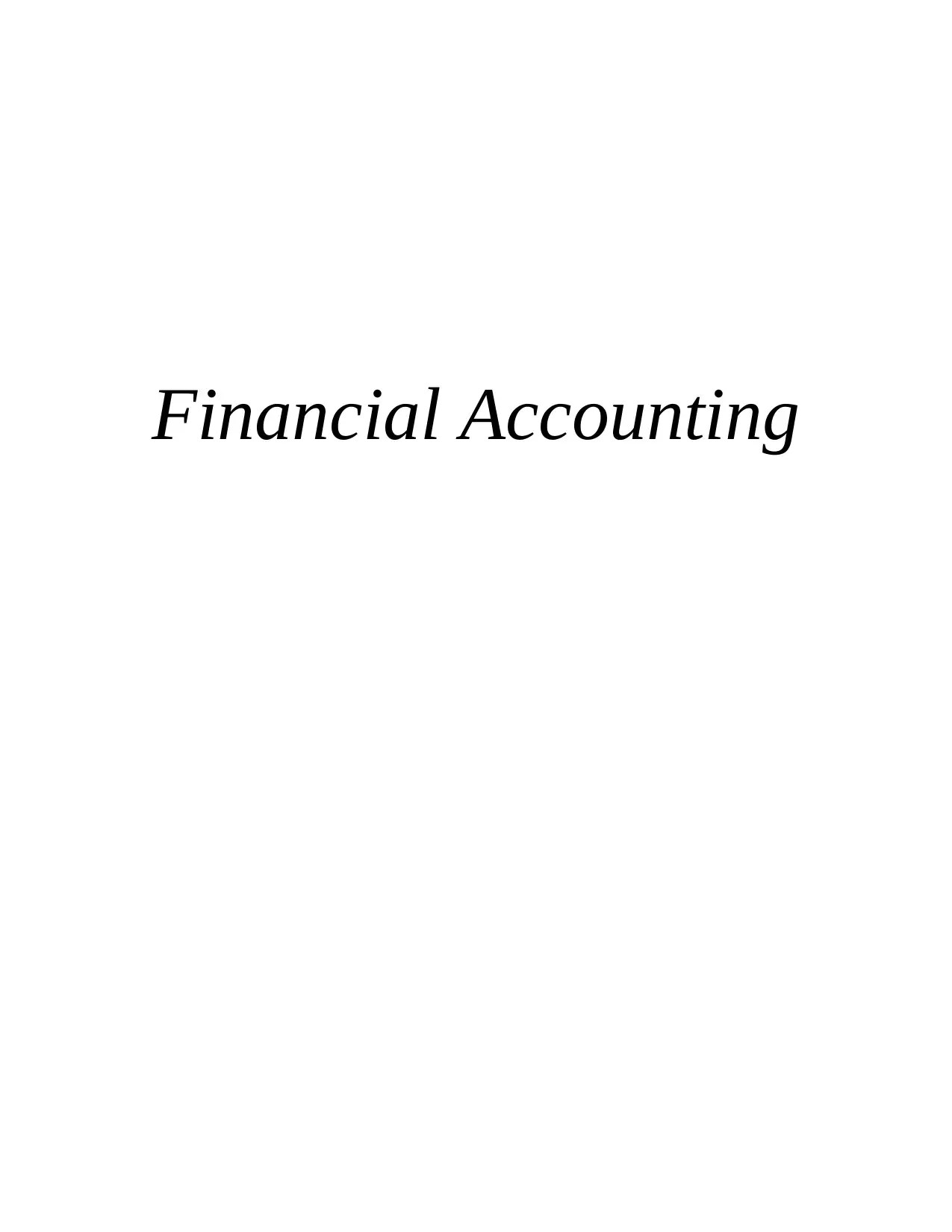
Financial Accounting
Paraphrase This Document
Need a fresh take? Get an instant paraphrase of this document with our AI Paraphraser
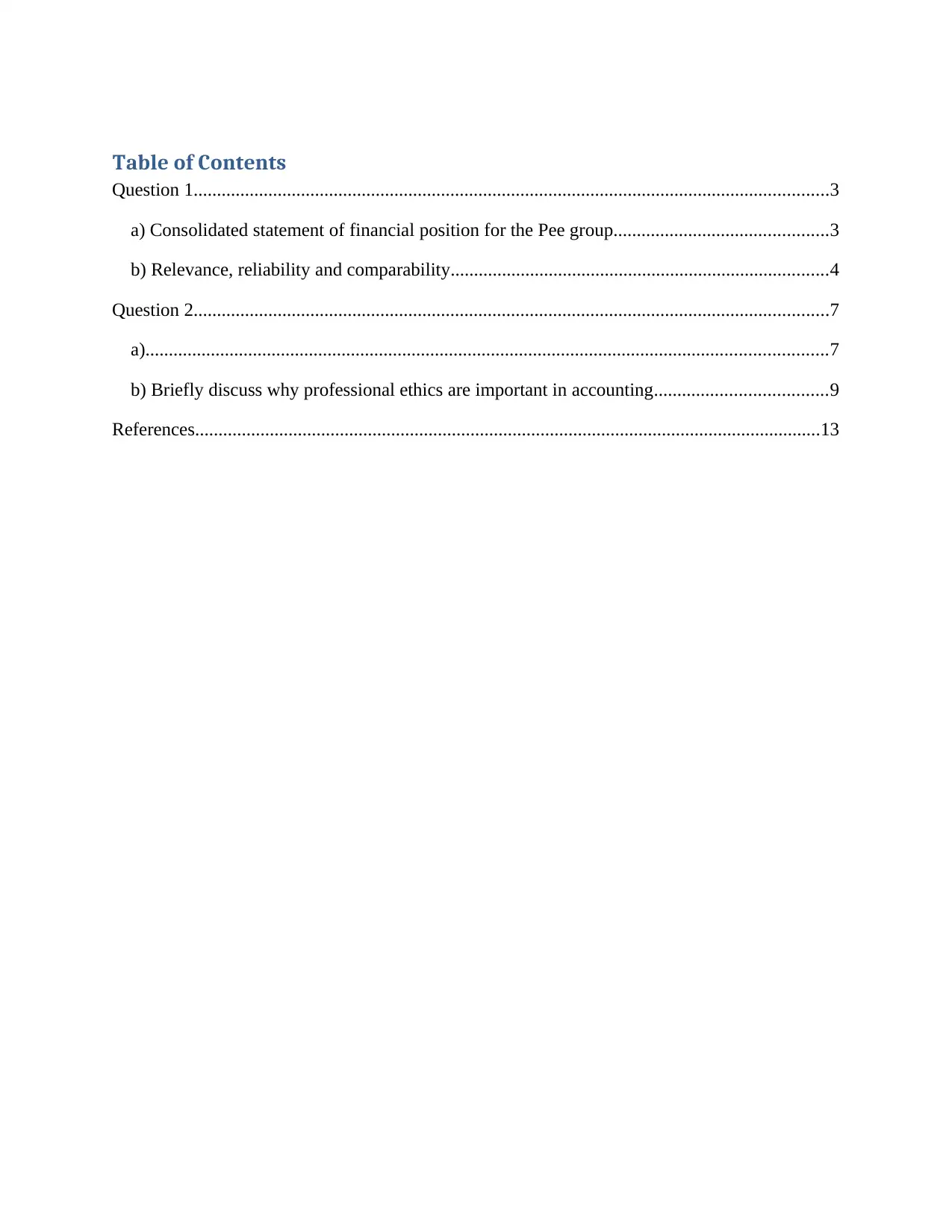
Table of Contents
Question 1........................................................................................................................................3
a) Consolidated statement of financial position for the Pee group..............................................3
b) Relevance, reliability and comparability.................................................................................4
Question 2........................................................................................................................................7
a)..................................................................................................................................................7
b) Briefly discuss why professional ethics are important in accounting.....................................9
References......................................................................................................................................13
Question 1........................................................................................................................................3
a) Consolidated statement of financial position for the Pee group..............................................3
b) Relevance, reliability and comparability.................................................................................4
Question 2........................................................................................................................................7
a)..................................................................................................................................................7
b) Briefly discuss why professional ethics are important in accounting.....................................9
References......................................................................................................................................13
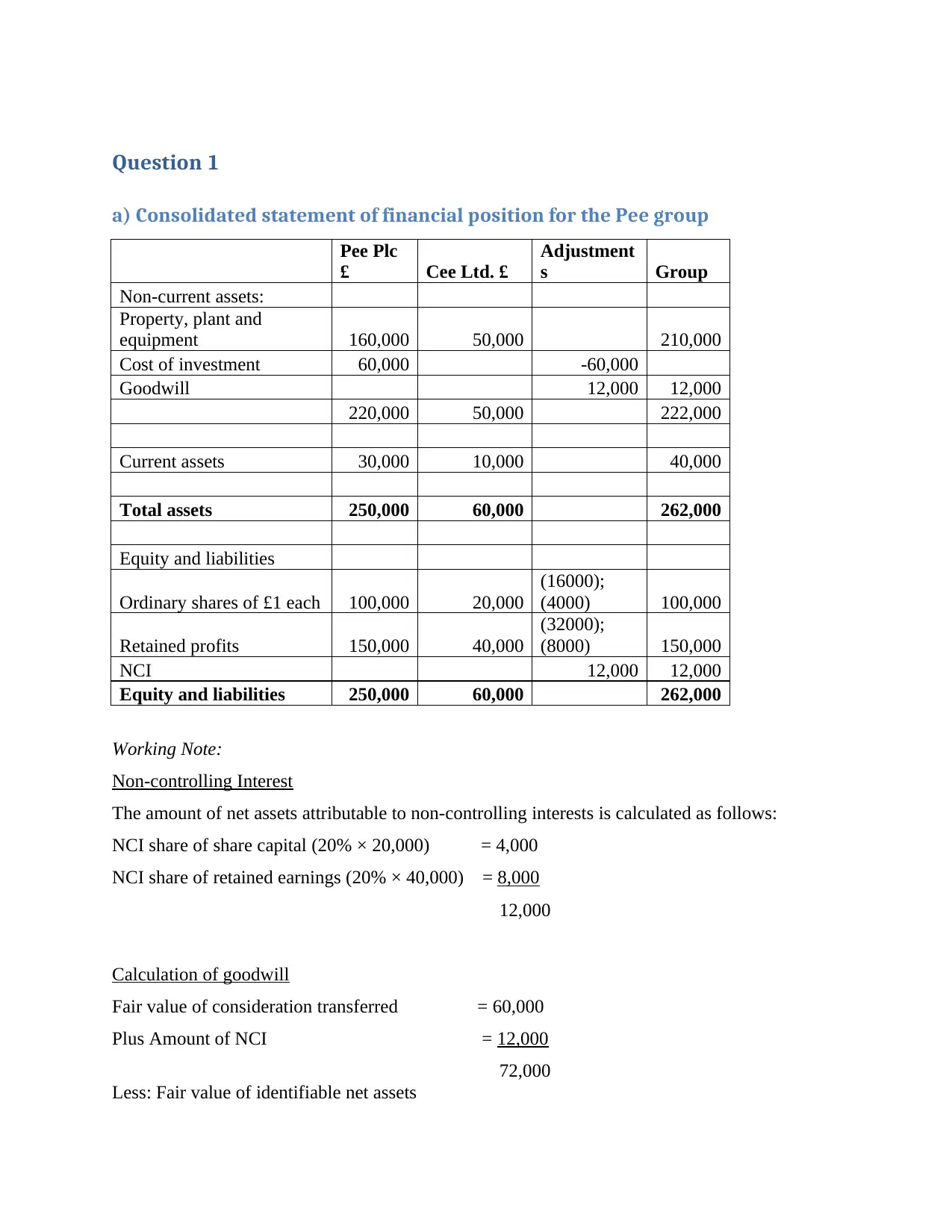
Question 1
a) Consolidated statement of financial position for the Pee group
Pee Plc
£ Cee Ltd. £
Adjustment
s Group
Non-current assets:
Property, plant and
equipment 160,000 50,000 210,000
Cost of investment 60,000 -60,000
Goodwill 12,000 12,000
220,000 50,000 222,000
Current assets 30,000 10,000 40,000
Total assets 250,000 60,000 262,000
Equity and liabilities
Ordinary shares of £1 each 100,000 20,000
(16000);
(4000) 100,000
Retained profits 150,000 40,000
(32000);
(8000) 150,000
NCI 12,000 12,000
Equity and liabilities 250,000 60,000 262,000
Working Note:
Non-controlling Interest
The amount of net assets attributable to non-controlling interests is calculated as follows:
NCI share of share capital (20% × 20,000) = 4,000
NCI share of retained earnings (20% × 40,000) = 8,000
12,000
Calculation of goodwill
Fair value of consideration transferred = 60,000
Plus Amount of NCI = 12,000
72,000
Less: Fair value of identifiable net assets
a) Consolidated statement of financial position for the Pee group
Pee Plc
£ Cee Ltd. £
Adjustment
s Group
Non-current assets:
Property, plant and
equipment 160,000 50,000 210,000
Cost of investment 60,000 -60,000
Goodwill 12,000 12,000
220,000 50,000 222,000
Current assets 30,000 10,000 40,000
Total assets 250,000 60,000 262,000
Equity and liabilities
Ordinary shares of £1 each 100,000 20,000
(16000);
(4000) 100,000
Retained profits 150,000 40,000
(32000);
(8000) 150,000
NCI 12,000 12,000
Equity and liabilities 250,000 60,000 262,000
Working Note:
Non-controlling Interest
The amount of net assets attributable to non-controlling interests is calculated as follows:
NCI share of share capital (20% × 20,000) = 4,000
NCI share of retained earnings (20% × 40,000) = 8,000
12,000
Calculation of goodwill
Fair value of consideration transferred = 60,000
Plus Amount of NCI = 12,000
72,000
Less: Fair value of identifiable net assets
⊘ This is a preview!⊘
Do you want full access?
Subscribe today to unlock all pages.

Trusted by 1+ million students worldwide
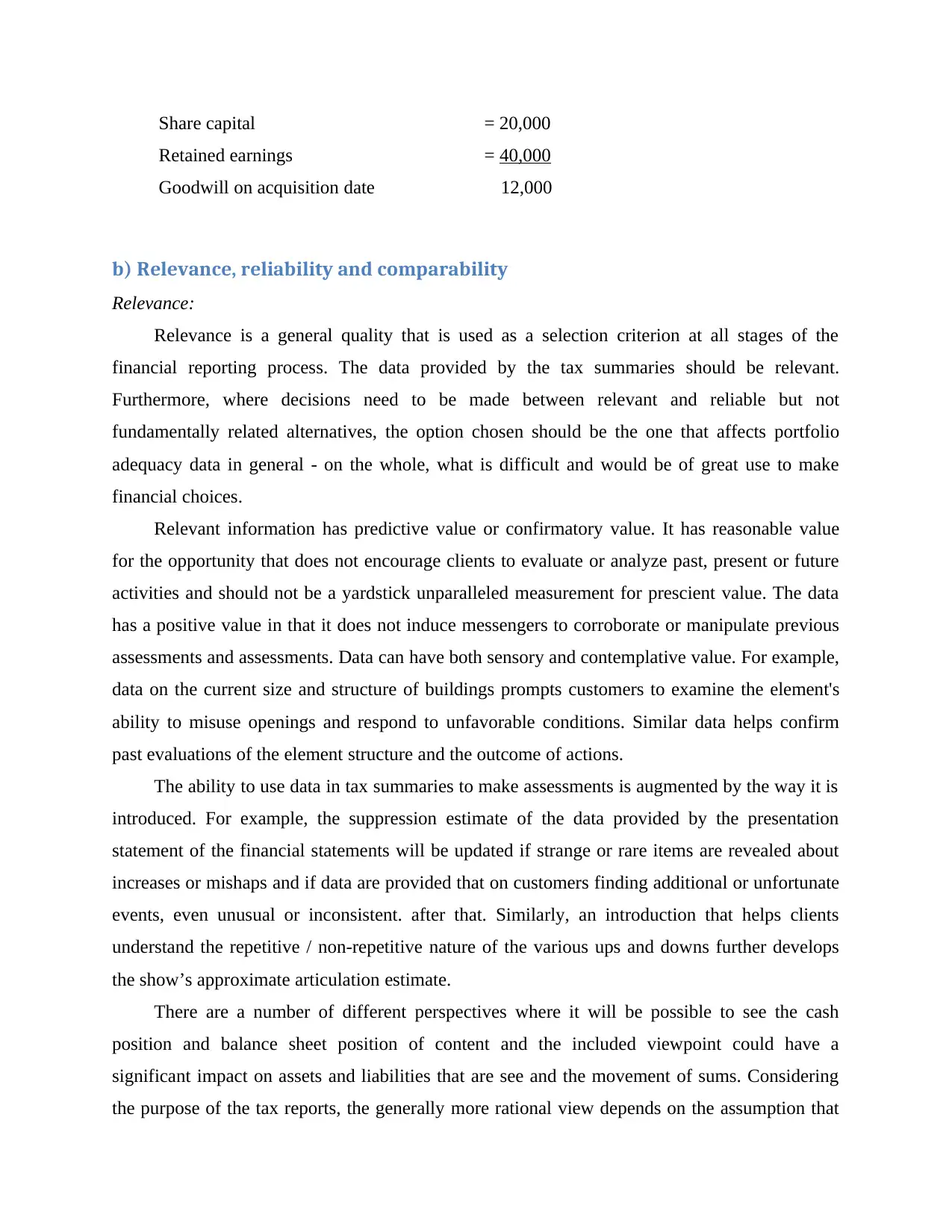
Share capital = 20,000
Retained earnings = 40,000
Goodwill on acquisition date 12,000
b) Relevance, reliability and comparability
Relevance:
Relevance is a general quality that is used as a selection criterion at all stages of the
financial reporting process. The data provided by the tax summaries should be relevant.
Furthermore, where decisions need to be made between relevant and reliable but not
fundamentally related alternatives, the option chosen should be the one that affects portfolio
adequacy data in general - on the whole, what is difficult and would be of great use to make
financial choices.
Relevant information has predictive value or confirmatory value. It has reasonable value
for the opportunity that does not encourage clients to evaluate or analyze past, present or future
activities and should not be a yardstick unparalleled measurement for prescient value. The data
has a positive value in that it does not induce messengers to corroborate or manipulate previous
assessments and assessments. Data can have both sensory and contemplative value. For example,
data on the current size and structure of buildings prompts customers to examine the element's
ability to misuse openings and respond to unfavorable conditions. Similar data helps confirm
past evaluations of the element structure and the outcome of actions.
The ability to use data in tax summaries to make assessments is augmented by the way it is
introduced. For example, the suppression estimate of the data provided by the presentation
statement of the financial statements will be updated if strange or rare items are revealed about
increases or mishaps and if data are provided that on customers finding additional or unfortunate
events, even unusual or inconsistent. after that. Similarly, an introduction that helps clients
understand the repetitive / non-repetitive nature of the various ups and downs further develops
the show’s approximate articulation estimate.
There are a number of different perspectives where it will be possible to see the cash
position and balance sheet position of content and the included viewpoint could have a
significant impact on assets and liabilities that are see and the movement of sums. Considering
the purpose of the tax reports, the generally more rational view depends on the assumption that
Retained earnings = 40,000
Goodwill on acquisition date 12,000
b) Relevance, reliability and comparability
Relevance:
Relevance is a general quality that is used as a selection criterion at all stages of the
financial reporting process. The data provided by the tax summaries should be relevant.
Furthermore, where decisions need to be made between relevant and reliable but not
fundamentally related alternatives, the option chosen should be the one that affects portfolio
adequacy data in general - on the whole, what is difficult and would be of great use to make
financial choices.
Relevant information has predictive value or confirmatory value. It has reasonable value
for the opportunity that does not encourage clients to evaluate or analyze past, present or future
activities and should not be a yardstick unparalleled measurement for prescient value. The data
has a positive value in that it does not induce messengers to corroborate or manipulate previous
assessments and assessments. Data can have both sensory and contemplative value. For example,
data on the current size and structure of buildings prompts customers to examine the element's
ability to misuse openings and respond to unfavorable conditions. Similar data helps confirm
past evaluations of the element structure and the outcome of actions.
The ability to use data in tax summaries to make assessments is augmented by the way it is
introduced. For example, the suppression estimate of the data provided by the presentation
statement of the financial statements will be updated if strange or rare items are revealed about
increases or mishaps and if data are provided that on customers finding additional or unfortunate
events, even unusual or inconsistent. after that. Similarly, an introduction that helps clients
understand the repetitive / non-repetitive nature of the various ups and downs further develops
the show’s approximate articulation estimate.
There are a number of different perspectives where it will be possible to see the cash
position and balance sheet position of content and the included viewpoint could have a
significant impact on assets and liabilities that are see and the movement of sums. Considering
the purpose of the tax reports, the generally more rational view depends on the assumption that
Paraphrase This Document
Need a fresh take? Get an instant paraphrase of this document with our AI Paraphraser
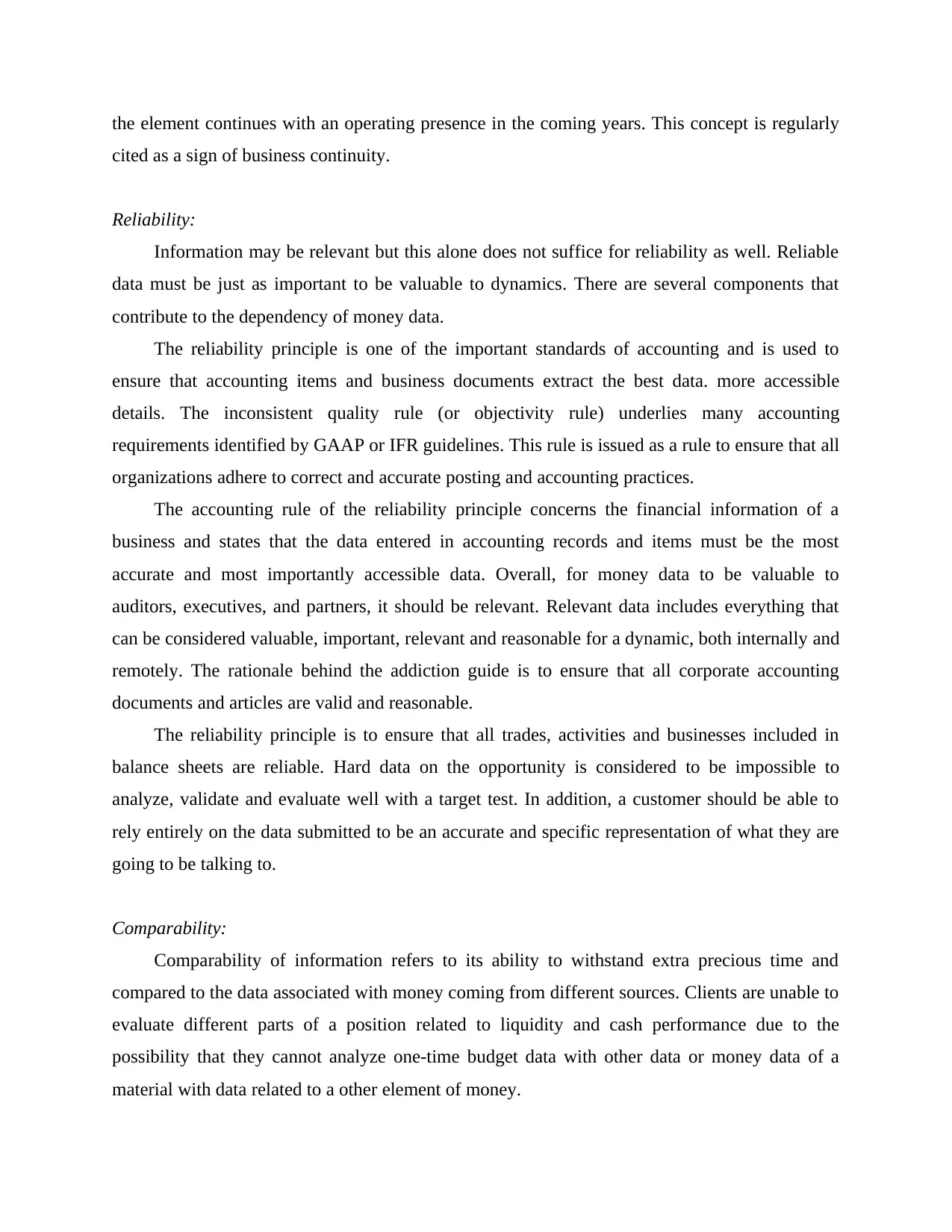
the element continues with an operating presence in the coming years. This concept is regularly
cited as a sign of business continuity.
Reliability:
Information may be relevant but this alone does not suffice for reliability as well. Reliable
data must be just as important to be valuable to dynamics. There are several components that
contribute to the dependency of money data.
The reliability principle is one of the important standards of accounting and is used to
ensure that accounting items and business documents extract the best data. more accessible
details. The inconsistent quality rule (or objectivity rule) underlies many accounting
requirements identified by GAAP or IFR guidelines. This rule is issued as a rule to ensure that all
organizations adhere to correct and accurate posting and accounting practices.
The accounting rule of the reliability principle concerns the financial information of a
business and states that the data entered in accounting records and items must be the most
accurate and most importantly accessible data. Overall, for money data to be valuable to
auditors, executives, and partners, it should be relevant. Relevant data includes everything that
can be considered valuable, important, relevant and reasonable for a dynamic, both internally and
remotely. The rationale behind the addiction guide is to ensure that all corporate accounting
documents and articles are valid and reasonable.
The reliability principle is to ensure that all trades, activities and businesses included in
balance sheets are reliable. Hard data on the opportunity is considered to be impossible to
analyze, validate and evaluate well with a target test. In addition, a customer should be able to
rely entirely on the data submitted to be an accurate and specific representation of what they are
going to be talking to.
Comparability:
Comparability of information refers to its ability to withstand extra precious time and
compared to the data associated with money coming from different sources. Clients are unable to
evaluate different parts of a position related to liquidity and cash performance due to the
possibility that they cannot analyze one-time budget data with other data or money data of a
material with data related to a other element of money.
cited as a sign of business continuity.
Reliability:
Information may be relevant but this alone does not suffice for reliability as well. Reliable
data must be just as important to be valuable to dynamics. There are several components that
contribute to the dependency of money data.
The reliability principle is one of the important standards of accounting and is used to
ensure that accounting items and business documents extract the best data. more accessible
details. The inconsistent quality rule (or objectivity rule) underlies many accounting
requirements identified by GAAP or IFR guidelines. This rule is issued as a rule to ensure that all
organizations adhere to correct and accurate posting and accounting practices.
The accounting rule of the reliability principle concerns the financial information of a
business and states that the data entered in accounting records and items must be the most
accurate and most importantly accessible data. Overall, for money data to be valuable to
auditors, executives, and partners, it should be relevant. Relevant data includes everything that
can be considered valuable, important, relevant and reasonable for a dynamic, both internally and
remotely. The rationale behind the addiction guide is to ensure that all corporate accounting
documents and articles are valid and reasonable.
The reliability principle is to ensure that all trades, activities and businesses included in
balance sheets are reliable. Hard data on the opportunity is considered to be impossible to
analyze, validate and evaluate well with a target test. In addition, a customer should be able to
rely entirely on the data submitted to be an accurate and specific representation of what they are
going to be talking to.
Comparability:
Comparability of information refers to its ability to withstand extra precious time and
compared to the data associated with money coming from different sources. Clients are unable to
evaluate different parts of a position related to liquidity and cash performance due to the
possibility that they cannot analyze one-time budget data with other data or money data of a
material with data related to a other element of money.
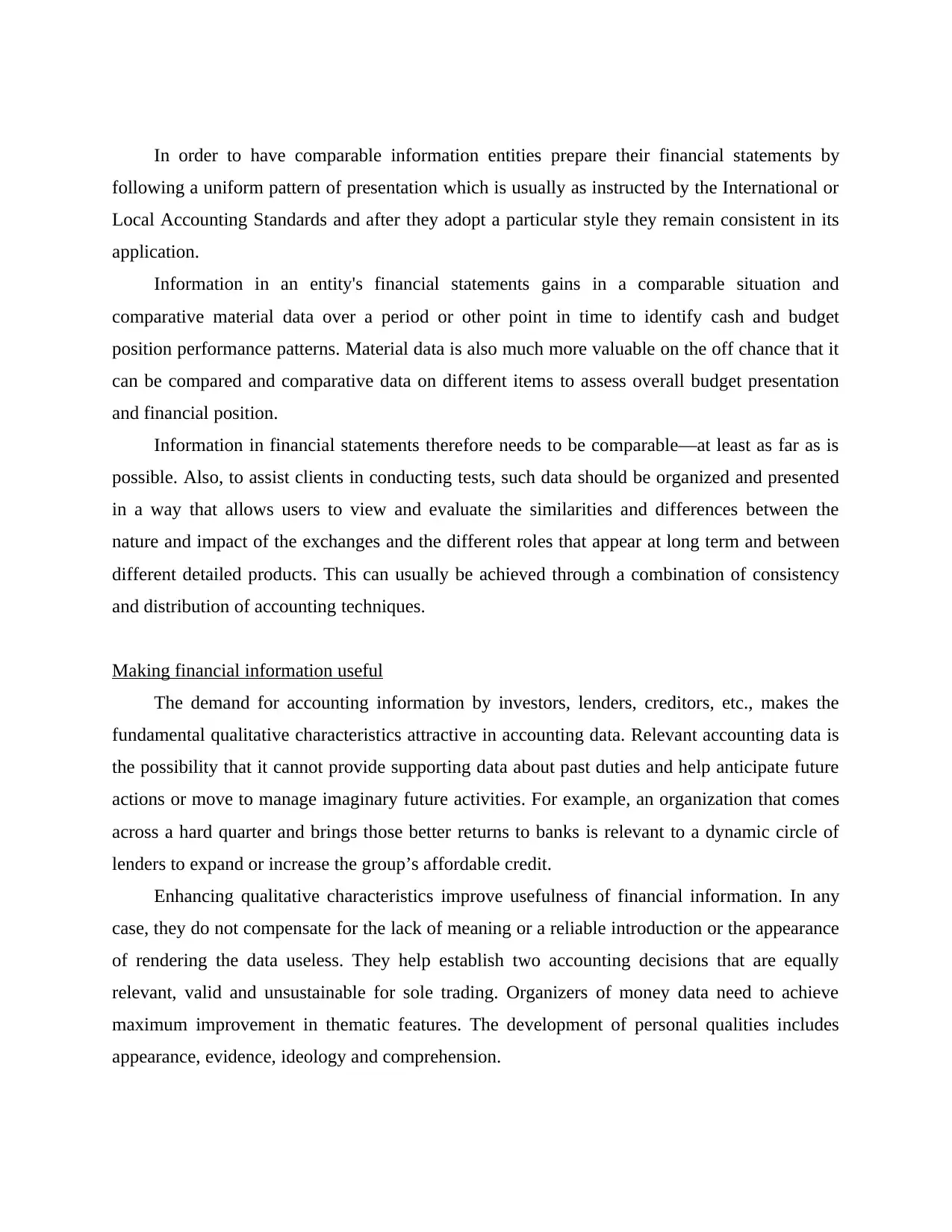
In order to have comparable information entities prepare their financial statements by
following a uniform pattern of presentation which is usually as instructed by the International or
Local Accounting Standards and after they adopt a particular style they remain consistent in its
application.
Information in an entity's financial statements gains in a comparable situation and
comparative material data over a period or other point in time to identify cash and budget
position performance patterns. Material data is also much more valuable on the off chance that it
can be compared and comparative data on different items to assess overall budget presentation
and financial position.
Information in financial statements therefore needs to be comparable—at least as far as is
possible. Also, to assist clients in conducting tests, such data should be organized and presented
in a way that allows users to view and evaluate the similarities and differences between the
nature and impact of the exchanges and the different roles that appear at long term and between
different detailed products. This can usually be achieved through a combination of consistency
and distribution of accounting techniques.
Making financial information useful
The demand for accounting information by investors, lenders, creditors, etc., makes the
fundamental qualitative characteristics attractive in accounting data. Relevant accounting data is
the possibility that it cannot provide supporting data about past duties and help anticipate future
actions or move to manage imaginary future activities. For example, an organization that comes
across a hard quarter and brings those better returns to banks is relevant to a dynamic circle of
lenders to expand or increase the group’s affordable credit.
Enhancing qualitative characteristics improve usefulness of financial information. In any
case, they do not compensate for the lack of meaning or a reliable introduction or the appearance
of rendering the data useless. They help establish two accounting decisions that are equally
relevant, valid and unsustainable for sole trading. Organizers of money data need to achieve
maximum improvement in thematic features. The development of personal qualities includes
appearance, evidence, ideology and comprehension.
following a uniform pattern of presentation which is usually as instructed by the International or
Local Accounting Standards and after they adopt a particular style they remain consistent in its
application.
Information in an entity's financial statements gains in a comparable situation and
comparative material data over a period or other point in time to identify cash and budget
position performance patterns. Material data is also much more valuable on the off chance that it
can be compared and comparative data on different items to assess overall budget presentation
and financial position.
Information in financial statements therefore needs to be comparable—at least as far as is
possible. Also, to assist clients in conducting tests, such data should be organized and presented
in a way that allows users to view and evaluate the similarities and differences between the
nature and impact of the exchanges and the different roles that appear at long term and between
different detailed products. This can usually be achieved through a combination of consistency
and distribution of accounting techniques.
Making financial information useful
The demand for accounting information by investors, lenders, creditors, etc., makes the
fundamental qualitative characteristics attractive in accounting data. Relevant accounting data is
the possibility that it cannot provide supporting data about past duties and help anticipate future
actions or move to manage imaginary future activities. For example, an organization that comes
across a hard quarter and brings those better returns to banks is relevant to a dynamic circle of
lenders to expand or increase the group’s affordable credit.
Enhancing qualitative characteristics improve usefulness of financial information. In any
case, they do not compensate for the lack of meaning or a reliable introduction or the appearance
of rendering the data useless. They help establish two accounting decisions that are equally
relevant, valid and unsustainable for sole trading. Organizers of money data need to achieve
maximum improvement in thematic features. The development of personal qualities includes
appearance, evidence, ideology and comprehension.
⊘ This is a preview!⊘
Do you want full access?
Subscribe today to unlock all pages.

Trusted by 1+ million students worldwide
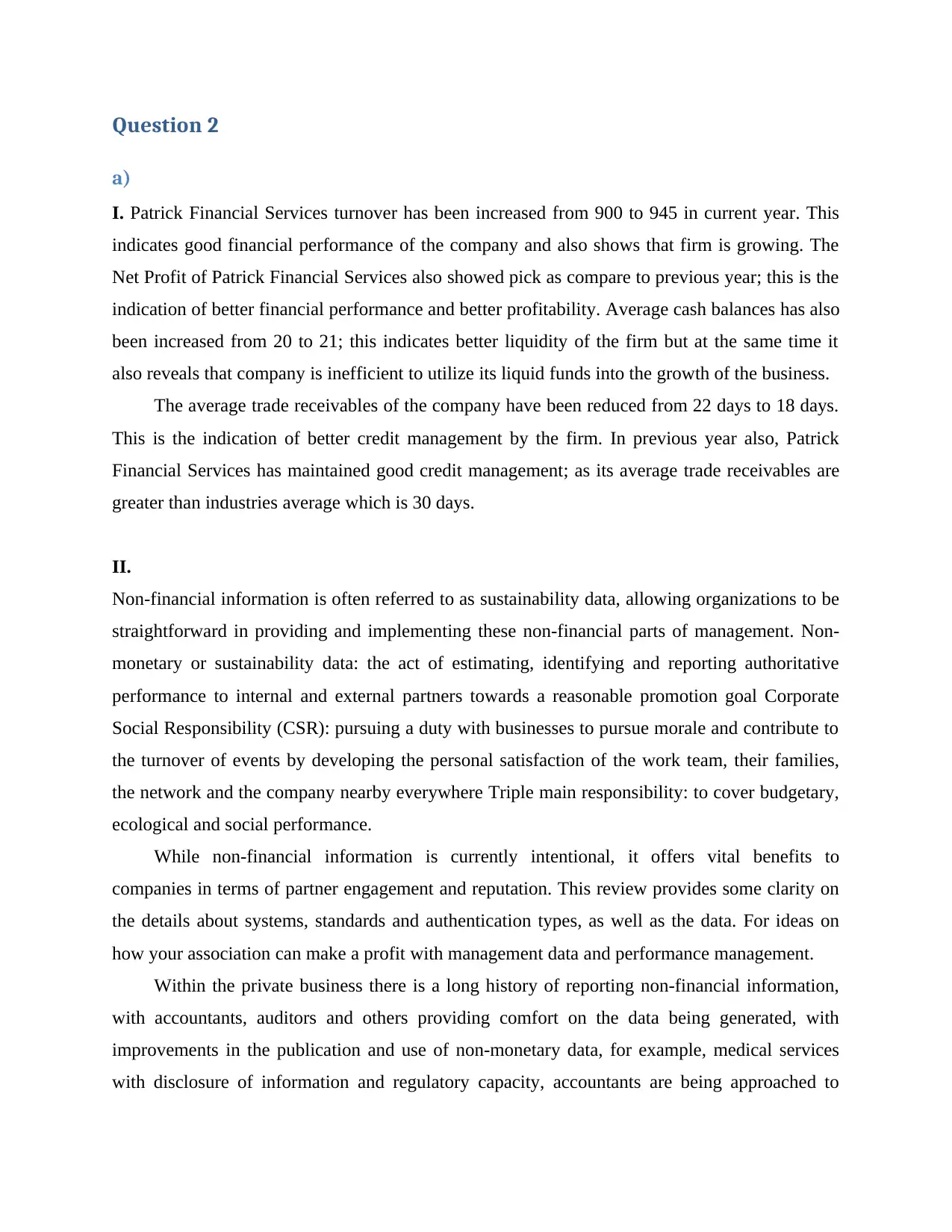
Question 2
a)
I. Patrick Financial Services turnover has been increased from 900 to 945 in current year. This
indicates good financial performance of the company and also shows that firm is growing. The
Net Profit of Patrick Financial Services also showed pick as compare to previous year; this is the
indication of better financial performance and better profitability. Average cash balances has also
been increased from 20 to 21; this indicates better liquidity of the firm but at the same time it
also reveals that company is inefficient to utilize its liquid funds into the growth of the business.
The average trade receivables of the company have been reduced from 22 days to 18 days.
This is the indication of better credit management by the firm. In previous year also, Patrick
Financial Services has maintained good credit management; as its average trade receivables are
greater than industries average which is 30 days.
II.
Non-financial information is often referred to as sustainability data, allowing organizations to be
straightforward in providing and implementing these non-financial parts of management. Non-
monetary or sustainability data: the act of estimating, identifying and reporting authoritative
performance to internal and external partners towards a reasonable promotion goal Corporate
Social Responsibility (CSR): pursuing a duty with businesses to pursue morale and contribute to
the turnover of events by developing the personal satisfaction of the work team, their families,
the network and the company nearby everywhere Triple main responsibility: to cover budgetary,
ecological and social performance.
While non-financial information is currently intentional, it offers vital benefits to
companies in terms of partner engagement and reputation. This review provides some clarity on
the details about systems, standards and authentication types, as well as the data. For ideas on
how your association can make a profit with management data and performance management.
Within the private business there is a long history of reporting non-financial information,
with accountants, auditors and others providing comfort on the data being generated, with
improvements in the publication and use of non-monetary data, for example, medical services
with disclosure of information and regulatory capacity, accountants are being approached to
a)
I. Patrick Financial Services turnover has been increased from 900 to 945 in current year. This
indicates good financial performance of the company and also shows that firm is growing. The
Net Profit of Patrick Financial Services also showed pick as compare to previous year; this is the
indication of better financial performance and better profitability. Average cash balances has also
been increased from 20 to 21; this indicates better liquidity of the firm but at the same time it
also reveals that company is inefficient to utilize its liquid funds into the growth of the business.
The average trade receivables of the company have been reduced from 22 days to 18 days.
This is the indication of better credit management by the firm. In previous year also, Patrick
Financial Services has maintained good credit management; as its average trade receivables are
greater than industries average which is 30 days.
II.
Non-financial information is often referred to as sustainability data, allowing organizations to be
straightforward in providing and implementing these non-financial parts of management. Non-
monetary or sustainability data: the act of estimating, identifying and reporting authoritative
performance to internal and external partners towards a reasonable promotion goal Corporate
Social Responsibility (CSR): pursuing a duty with businesses to pursue morale and contribute to
the turnover of events by developing the personal satisfaction of the work team, their families,
the network and the company nearby everywhere Triple main responsibility: to cover budgetary,
ecological and social performance.
While non-financial information is currently intentional, it offers vital benefits to
companies in terms of partner engagement and reputation. This review provides some clarity on
the details about systems, standards and authentication types, as well as the data. For ideas on
how your association can make a profit with management data and performance management.
Within the private business there is a long history of reporting non-financial information,
with accountants, auditors and others providing comfort on the data being generated, with
improvements in the publication and use of non-monetary data, for example, medical services
with disclosure of information and regulatory capacity, accountants are being approached to
Paraphrase This Document
Need a fresh take? Get an instant paraphrase of this document with our AI Paraphraser
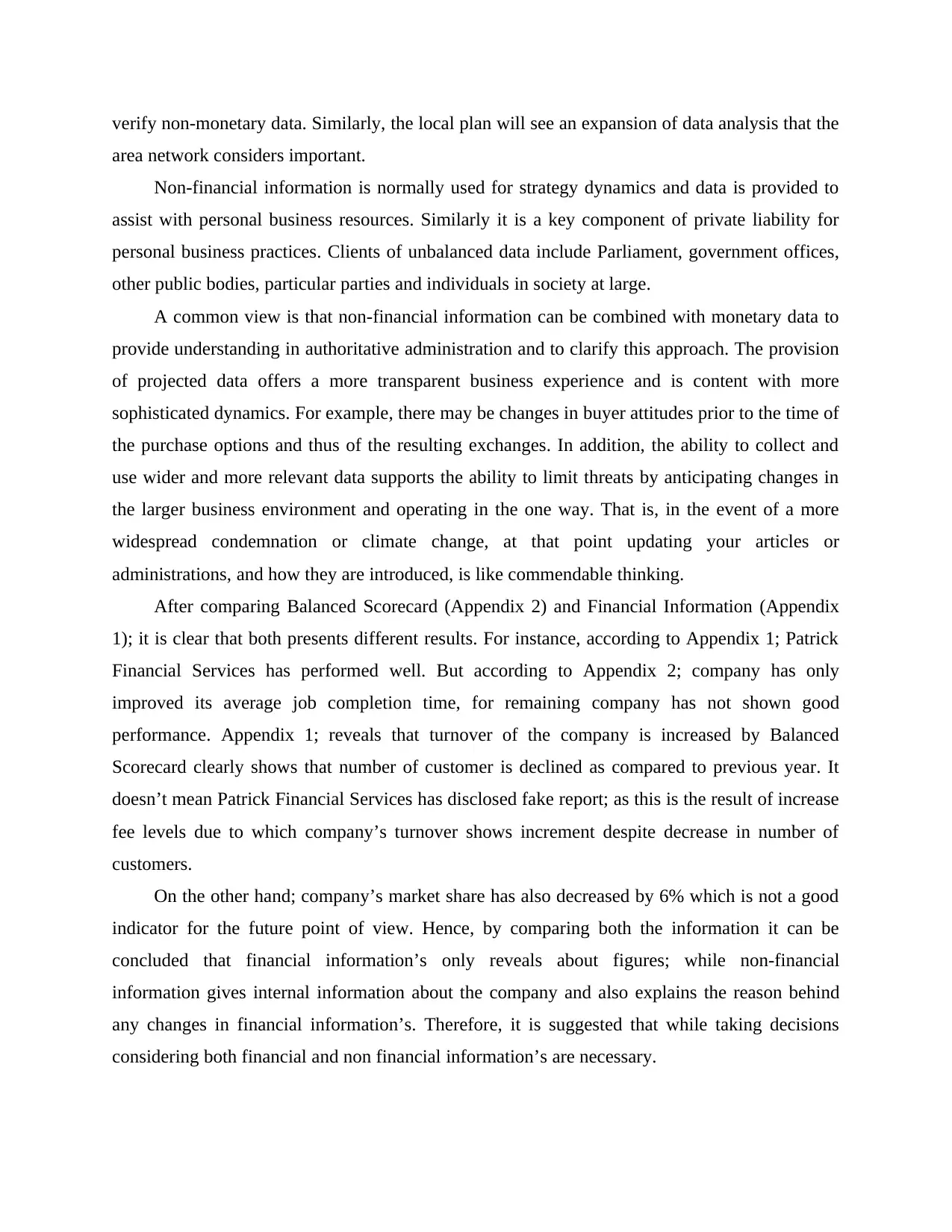
verify non-monetary data. Similarly, the local plan will see an expansion of data analysis that the
area network considers important.
Non-financial information is normally used for strategy dynamics and data is provided to
assist with personal business resources. Similarly it is a key component of private liability for
personal business practices. Clients of unbalanced data include Parliament, government offices,
other public bodies, particular parties and individuals in society at large.
A common view is that non-financial information can be combined with monetary data to
provide understanding in authoritative administration and to clarify this approach. The provision
of projected data offers a more transparent business experience and is content with more
sophisticated dynamics. For example, there may be changes in buyer attitudes prior to the time of
the purchase options and thus of the resulting exchanges. In addition, the ability to collect and
use wider and more relevant data supports the ability to limit threats by anticipating changes in
the larger business environment and operating in the one way. That is, in the event of a more
widespread condemnation or climate change, at that point updating your articles or
administrations, and how they are introduced, is like commendable thinking.
After comparing Balanced Scorecard (Appendix 2) and Financial Information (Appendix
1); it is clear that both presents different results. For instance, according to Appendix 1; Patrick
Financial Services has performed well. But according to Appendix 2; company has only
improved its average job completion time, for remaining company has not shown good
performance. Appendix 1; reveals that turnover of the company is increased by Balanced
Scorecard clearly shows that number of customer is declined as compared to previous year. It
doesn’t mean Patrick Financial Services has disclosed fake report; as this is the result of increase
fee levels due to which company’s turnover shows increment despite decrease in number of
customers.
On the other hand; company’s market share has also decreased by 6% which is not a good
indicator for the future point of view. Hence, by comparing both the information it can be
concluded that financial information’s only reveals about figures; while non-financial
information gives internal information about the company and also explains the reason behind
any changes in financial information’s. Therefore, it is suggested that while taking decisions
considering both financial and non financial information’s are necessary.
area network considers important.
Non-financial information is normally used for strategy dynamics and data is provided to
assist with personal business resources. Similarly it is a key component of private liability for
personal business practices. Clients of unbalanced data include Parliament, government offices,
other public bodies, particular parties and individuals in society at large.
A common view is that non-financial information can be combined with monetary data to
provide understanding in authoritative administration and to clarify this approach. The provision
of projected data offers a more transparent business experience and is content with more
sophisticated dynamics. For example, there may be changes in buyer attitudes prior to the time of
the purchase options and thus of the resulting exchanges. In addition, the ability to collect and
use wider and more relevant data supports the ability to limit threats by anticipating changes in
the larger business environment and operating in the one way. That is, in the event of a more
widespread condemnation or climate change, at that point updating your articles or
administrations, and how they are introduced, is like commendable thinking.
After comparing Balanced Scorecard (Appendix 2) and Financial Information (Appendix
1); it is clear that both presents different results. For instance, according to Appendix 1; Patrick
Financial Services has performed well. But according to Appendix 2; company has only
improved its average job completion time, for remaining company has not shown good
performance. Appendix 1; reveals that turnover of the company is increased by Balanced
Scorecard clearly shows that number of customer is declined as compared to previous year. It
doesn’t mean Patrick Financial Services has disclosed fake report; as this is the result of increase
fee levels due to which company’s turnover shows increment despite decrease in number of
customers.
On the other hand; company’s market share has also decreased by 6% which is not a good
indicator for the future point of view. Hence, by comparing both the information it can be
concluded that financial information’s only reveals about figures; while non-financial
information gives internal information about the company and also explains the reason behind
any changes in financial information’s. Therefore, it is suggested that while taking decisions
considering both financial and non financial information’s are necessary.
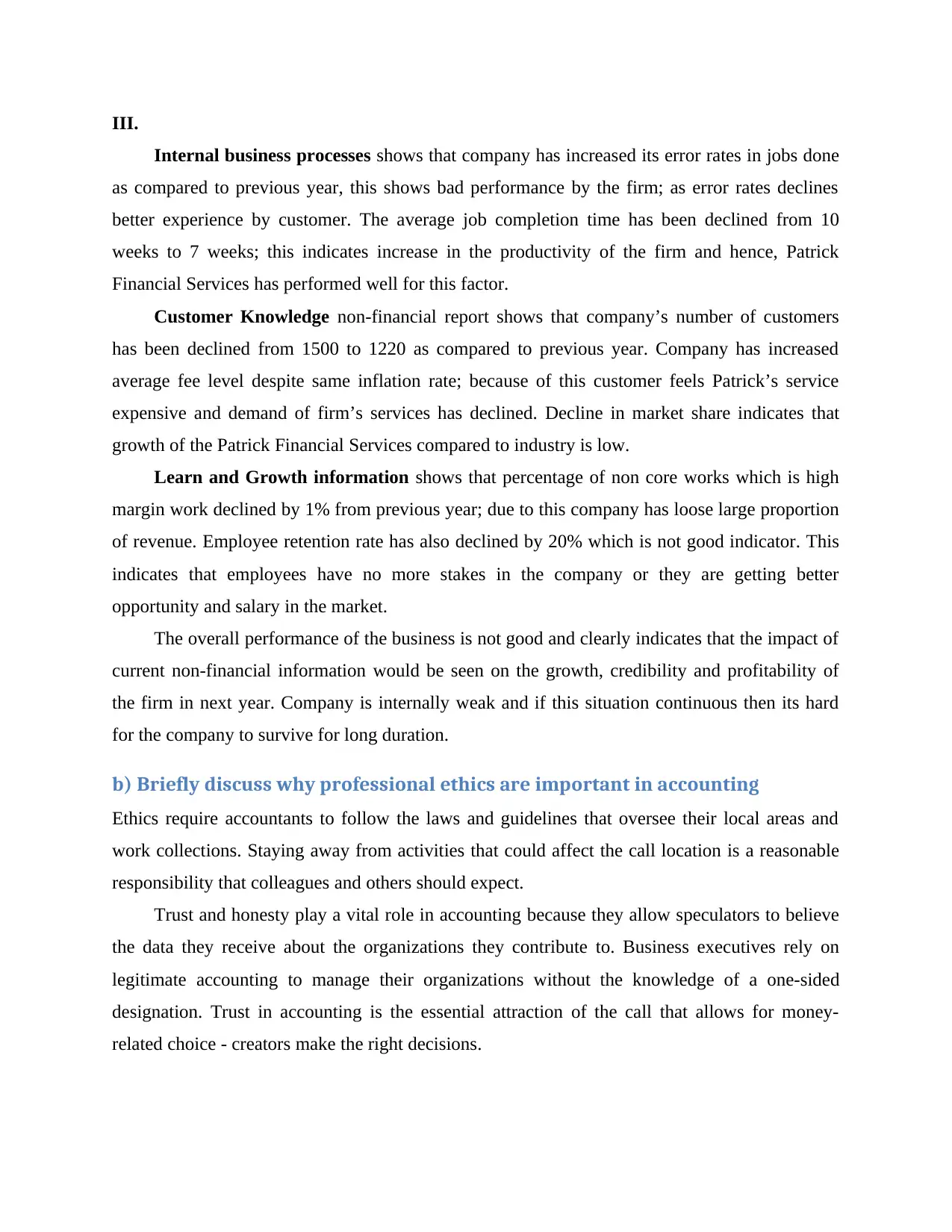
III.
Internal business processes shows that company has increased its error rates in jobs done
as compared to previous year, this shows bad performance by the firm; as error rates declines
better experience by customer. The average job completion time has been declined from 10
weeks to 7 weeks; this indicates increase in the productivity of the firm and hence, Patrick
Financial Services has performed well for this factor.
Customer Knowledge non-financial report shows that company’s number of customers
has been declined from 1500 to 1220 as compared to previous year. Company has increased
average fee level despite same inflation rate; because of this customer feels Patrick’s service
expensive and demand of firm’s services has declined. Decline in market share indicates that
growth of the Patrick Financial Services compared to industry is low.
Learn and Growth information shows that percentage of non core works which is high
margin work declined by 1% from previous year; due to this company has loose large proportion
of revenue. Employee retention rate has also declined by 20% which is not good indicator. This
indicates that employees have no more stakes in the company or they are getting better
opportunity and salary in the market.
The overall performance of the business is not good and clearly indicates that the impact of
current non-financial information would be seen on the growth, credibility and profitability of
the firm in next year. Company is internally weak and if this situation continuous then its hard
for the company to survive for long duration.
b) Briefly discuss why professional ethics are important in accounting
Ethics require accountants to follow the laws and guidelines that oversee their local areas and
work collections. Staying away from activities that could affect the call location is a reasonable
responsibility that colleagues and others should expect.
Trust and honesty play a vital role in accounting because they allow speculators to believe
the data they receive about the organizations they contribute to. Business executives rely on
legitimate accounting to manage their organizations without the knowledge of a one-sided
designation. Trust in accounting is the essential attraction of the call that allows for money-
related choice - creators make the right decisions.
Internal business processes shows that company has increased its error rates in jobs done
as compared to previous year, this shows bad performance by the firm; as error rates declines
better experience by customer. The average job completion time has been declined from 10
weeks to 7 weeks; this indicates increase in the productivity of the firm and hence, Patrick
Financial Services has performed well for this factor.
Customer Knowledge non-financial report shows that company’s number of customers
has been declined from 1500 to 1220 as compared to previous year. Company has increased
average fee level despite same inflation rate; because of this customer feels Patrick’s service
expensive and demand of firm’s services has declined. Decline in market share indicates that
growth of the Patrick Financial Services compared to industry is low.
Learn and Growth information shows that percentage of non core works which is high
margin work declined by 1% from previous year; due to this company has loose large proportion
of revenue. Employee retention rate has also declined by 20% which is not good indicator. This
indicates that employees have no more stakes in the company or they are getting better
opportunity and salary in the market.
The overall performance of the business is not good and clearly indicates that the impact of
current non-financial information would be seen on the growth, credibility and profitability of
the firm in next year. Company is internally weak and if this situation continuous then its hard
for the company to survive for long duration.
b) Briefly discuss why professional ethics are important in accounting
Ethics require accountants to follow the laws and guidelines that oversee their local areas and
work collections. Staying away from activities that could affect the call location is a reasonable
responsibility that colleagues and others should expect.
Trust and honesty play a vital role in accounting because they allow speculators to believe
the data they receive about the organizations they contribute to. Business executives rely on
legitimate accounting to manage their organizations without the knowledge of a one-sided
designation. Trust in accounting is the essential attraction of the call that allows for money-
related choice - creators make the right decisions.
⊘ This is a preview!⊘
Do you want full access?
Subscribe today to unlock all pages.

Trusted by 1+ million students worldwide
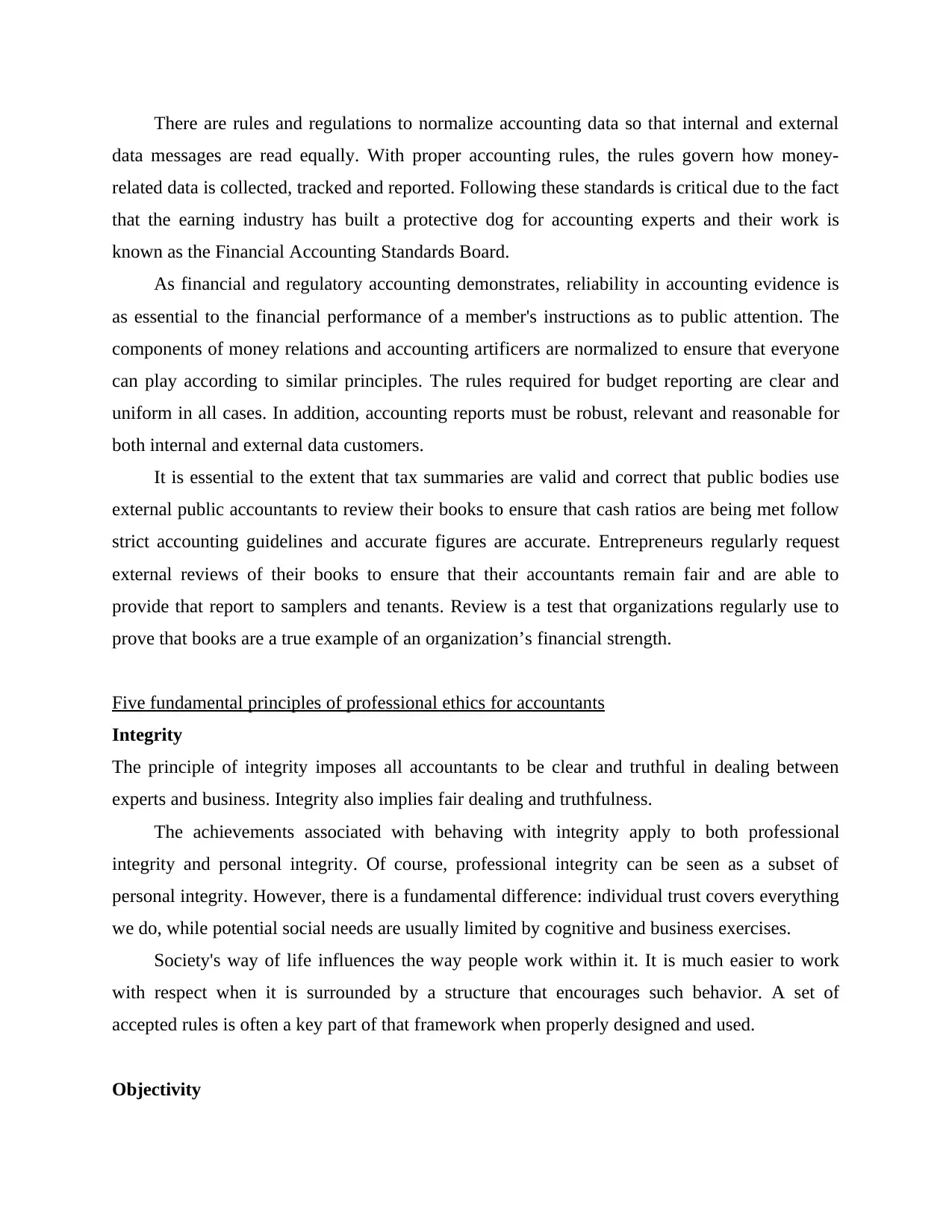
There are rules and regulations to normalize accounting data so that internal and external
data messages are read equally. With proper accounting rules, the rules govern how money-
related data is collected, tracked and reported. Following these standards is critical due to the fact
that the earning industry has built a protective dog for accounting experts and their work is
known as the Financial Accounting Standards Board.
As financial and regulatory accounting demonstrates, reliability in accounting evidence is
as essential to the financial performance of a member's instructions as to public attention. The
components of money relations and accounting artificers are normalized to ensure that everyone
can play according to similar principles. The rules required for budget reporting are clear and
uniform in all cases. In addition, accounting reports must be robust, relevant and reasonable for
both internal and external data customers.
It is essential to the extent that tax summaries are valid and correct that public bodies use
external public accountants to review their books to ensure that cash ratios are being met follow
strict accounting guidelines and accurate figures are accurate. Entrepreneurs regularly request
external reviews of their books to ensure that their accountants remain fair and are able to
provide that report to samplers and tenants. Review is a test that organizations regularly use to
prove that books are a true example of an organization’s financial strength.
Five fundamental principles of professional ethics for accountants
Integrity
The principle of integrity imposes all accountants to be clear and truthful in dealing between
experts and business. Integrity also implies fair dealing and truthfulness.
The achievements associated with behaving with integrity apply to both professional
integrity and personal integrity. Of course, professional integrity can be seen as a subset of
personal integrity. However, there is a fundamental difference: individual trust covers everything
we do, while potential social needs are usually limited by cognitive and business exercises.
Society's way of life influences the way people work within it. It is much easier to work
with respect when it is surrounded by a structure that encourages such behavior. A set of
accepted rules is often a key part of that framework when properly designed and used.
Objectivity
data messages are read equally. With proper accounting rules, the rules govern how money-
related data is collected, tracked and reported. Following these standards is critical due to the fact
that the earning industry has built a protective dog for accounting experts and their work is
known as the Financial Accounting Standards Board.
As financial and regulatory accounting demonstrates, reliability in accounting evidence is
as essential to the financial performance of a member's instructions as to public attention. The
components of money relations and accounting artificers are normalized to ensure that everyone
can play according to similar principles. The rules required for budget reporting are clear and
uniform in all cases. In addition, accounting reports must be robust, relevant and reasonable for
both internal and external data customers.
It is essential to the extent that tax summaries are valid and correct that public bodies use
external public accountants to review their books to ensure that cash ratios are being met follow
strict accounting guidelines and accurate figures are accurate. Entrepreneurs regularly request
external reviews of their books to ensure that their accountants remain fair and are able to
provide that report to samplers and tenants. Review is a test that organizations regularly use to
prove that books are a true example of an organization’s financial strength.
Five fundamental principles of professional ethics for accountants
Integrity
The principle of integrity imposes all accountants to be clear and truthful in dealing between
experts and business. Integrity also implies fair dealing and truthfulness.
The achievements associated with behaving with integrity apply to both professional
integrity and personal integrity. Of course, professional integrity can be seen as a subset of
personal integrity. However, there is a fundamental difference: individual trust covers everything
we do, while potential social needs are usually limited by cognitive and business exercises.
Society's way of life influences the way people work within it. It is much easier to work
with respect when it is surrounded by a structure that encourages such behavior. A set of
accepted rules is often a key part of that framework when properly designed and used.
Objectivity
Paraphrase This Document
Need a fresh take? Get an instant paraphrase of this document with our AI Paraphraser
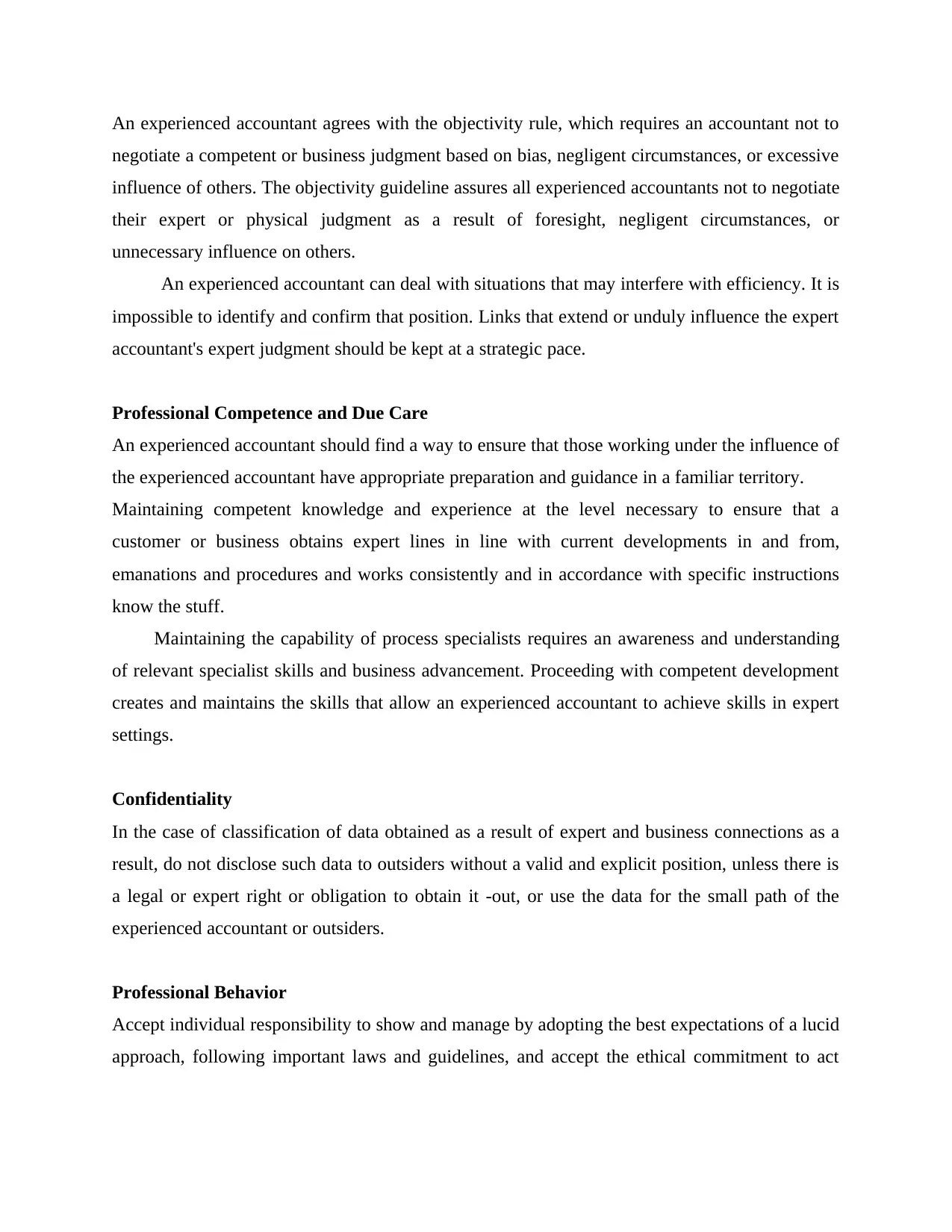
An experienced accountant agrees with the objectivity rule, which requires an accountant not to
negotiate a competent or business judgment based on bias, negligent circumstances, or excessive
influence of others. The objectivity guideline assures all experienced accountants not to negotiate
their expert or physical judgment as a result of foresight, negligent circumstances, or
unnecessary influence on others.
An experienced accountant can deal with situations that may interfere with efficiency. It is
impossible to identify and confirm that position. Links that extend or unduly influence the expert
accountant's expert judgment should be kept at a strategic pace.
Professional Competence and Due Care
An experienced accountant should find a way to ensure that those working under the influence of
the experienced accountant have appropriate preparation and guidance in a familiar territory.
Maintaining competent knowledge and experience at the level necessary to ensure that a
customer or business obtains expert lines in line with current developments in and from,
emanations and procedures and works consistently and in accordance with specific instructions
know the stuff.
Maintaining the capability of process specialists requires an awareness and understanding
of relevant specialist skills and business advancement. Proceeding with competent development
creates and maintains the skills that allow an experienced accountant to achieve skills in expert
settings.
Confidentiality
In the case of classification of data obtained as a result of expert and business connections as a
result, do not disclose such data to outsiders without a valid and explicit position, unless there is
a legal or expert right or obligation to obtain it -out, or use the data for the small path of the
experienced accountant or outsiders.
Professional Behavior
Accept individual responsibility to show and manage by adopting the best expectations of a lucid
approach, following important laws and guidelines, and accept the ethical commitment to act
negotiate a competent or business judgment based on bias, negligent circumstances, or excessive
influence of others. The objectivity guideline assures all experienced accountants not to negotiate
their expert or physical judgment as a result of foresight, negligent circumstances, or
unnecessary influence on others.
An experienced accountant can deal with situations that may interfere with efficiency. It is
impossible to identify and confirm that position. Links that extend or unduly influence the expert
accountant's expert judgment should be kept at a strategic pace.
Professional Competence and Due Care
An experienced accountant should find a way to ensure that those working under the influence of
the experienced accountant have appropriate preparation and guidance in a familiar territory.
Maintaining competent knowledge and experience at the level necessary to ensure that a
customer or business obtains expert lines in line with current developments in and from,
emanations and procedures and works consistently and in accordance with specific instructions
know the stuff.
Maintaining the capability of process specialists requires an awareness and understanding
of relevant specialist skills and business advancement. Proceeding with competent development
creates and maintains the skills that allow an experienced accountant to achieve skills in expert
settings.
Confidentiality
In the case of classification of data obtained as a result of expert and business connections as a
result, do not disclose such data to outsiders without a valid and explicit position, unless there is
a legal or expert right or obligation to obtain it -out, or use the data for the small path of the
experienced accountant or outsiders.
Professional Behavior
Accept individual responsibility to show and manage by adopting the best expectations of a lucid
approach, following important laws and guidelines, and accept the ethical commitment to act
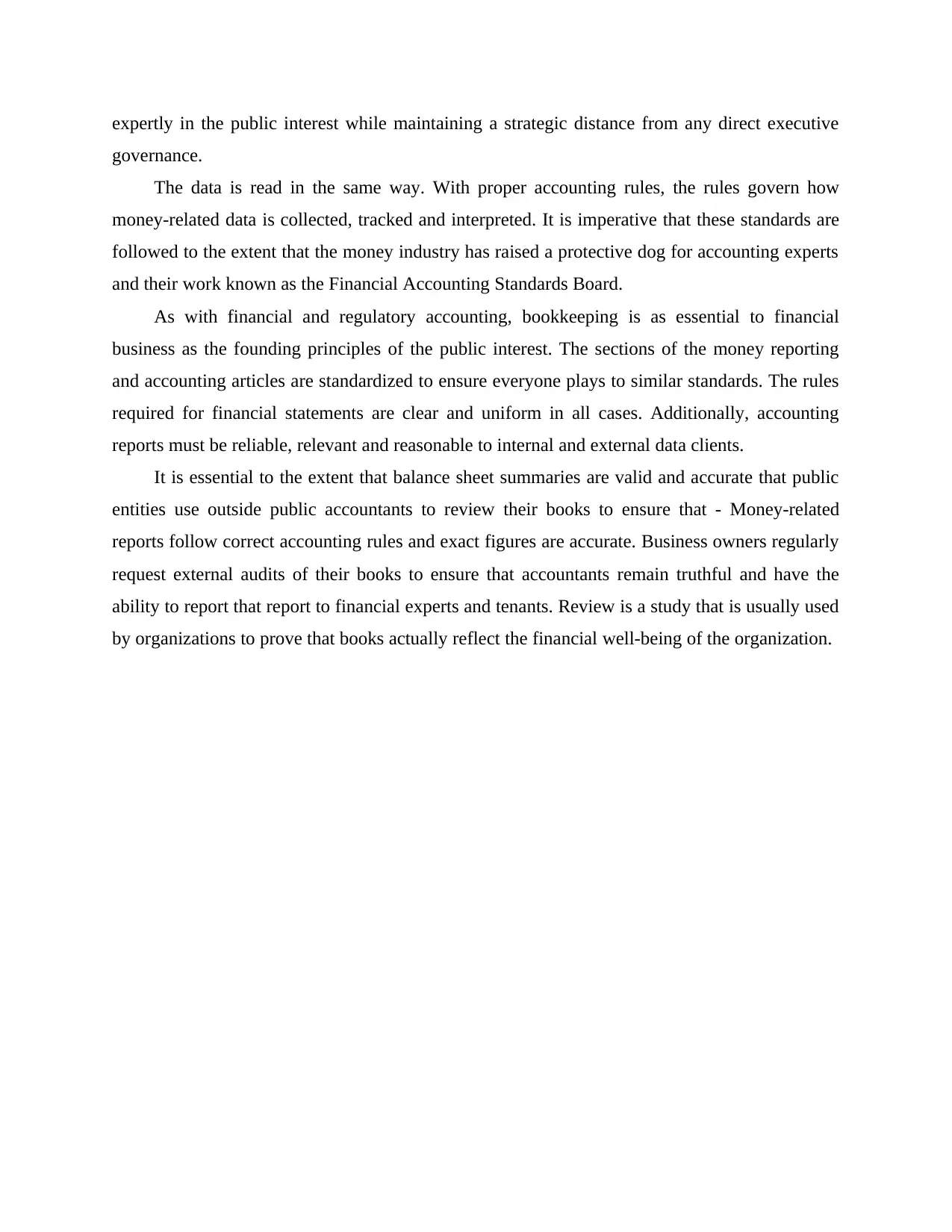
expertly in the public interest while maintaining a strategic distance from any direct executive
governance.
The data is read in the same way. With proper accounting rules, the rules govern how
money-related data is collected, tracked and interpreted. It is imperative that these standards are
followed to the extent that the money industry has raised a protective dog for accounting experts
and their work known as the Financial Accounting Standards Board.
As with financial and regulatory accounting, bookkeeping is as essential to financial
business as the founding principles of the public interest. The sections of the money reporting
and accounting articles are standardized to ensure everyone plays to similar standards. The rules
required for financial statements are clear and uniform in all cases. Additionally, accounting
reports must be reliable, relevant and reasonable to internal and external data clients.
It is essential to the extent that balance sheet summaries are valid and accurate that public
entities use outside public accountants to review their books to ensure that - Money-related
reports follow correct accounting rules and exact figures are accurate. Business owners regularly
request external audits of their books to ensure that accountants remain truthful and have the
ability to report that report to financial experts and tenants. Review is a study that is usually used
by organizations to prove that books actually reflect the financial well-being of the organization.
governance.
The data is read in the same way. With proper accounting rules, the rules govern how
money-related data is collected, tracked and interpreted. It is imperative that these standards are
followed to the extent that the money industry has raised a protective dog for accounting experts
and their work known as the Financial Accounting Standards Board.
As with financial and regulatory accounting, bookkeeping is as essential to financial
business as the founding principles of the public interest. The sections of the money reporting
and accounting articles are standardized to ensure everyone plays to similar standards. The rules
required for financial statements are clear and uniform in all cases. Additionally, accounting
reports must be reliable, relevant and reasonable to internal and external data clients.
It is essential to the extent that balance sheet summaries are valid and accurate that public
entities use outside public accountants to review their books to ensure that - Money-related
reports follow correct accounting rules and exact figures are accurate. Business owners regularly
request external audits of their books to ensure that accountants remain truthful and have the
ability to report that report to financial experts and tenants. Review is a study that is usually used
by organizations to prove that books actually reflect the financial well-being of the organization.
⊘ This is a preview!⊘
Do you want full access?
Subscribe today to unlock all pages.

Trusted by 1+ million students worldwide
1 out of 13
Related Documents
Your All-in-One AI-Powered Toolkit for Academic Success.
+13062052269
info@desklib.com
Available 24*7 on WhatsApp / Email
![[object Object]](/_next/static/media/star-bottom.7253800d.svg)
Unlock your academic potential
Copyright © 2020–2026 A2Z Services. All Rights Reserved. Developed and managed by ZUCOL.





